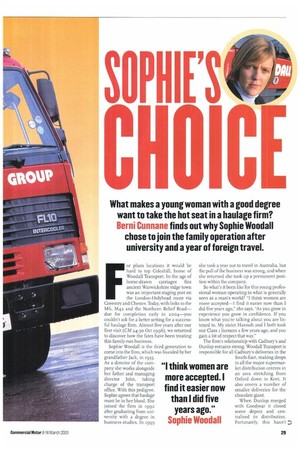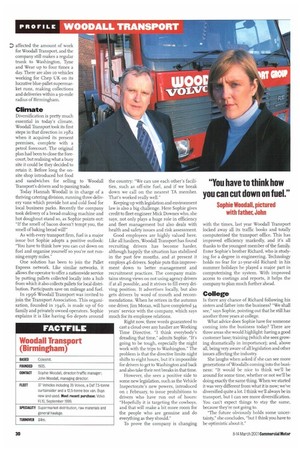SOP IES
Page 31

Page 32

If you've noticed an error in this article please click here to report it so we can fix it.
What makes a young woman with a good degree want to take the hot seat in a haulage firm?
Berni Cunnane finds out why Sophie Woodall chose to join the family operation after university and a year of foreign travel.
For plum locations it would be hard to top Coleshill, home of Woodall Transport. In the age of horse-drawn carriages this ancient Warwickshire ridge town was an important staging post on the London-Holyhead route via Coventry and Chester. Today, with links to the M6, M42 and the Northern Relief Road— due for completion early in 2004—you couldn't ask for a better setting for a successful haulage firm. Almost five years after our first visit (CM 24-30 Oct 1996), we returned to discover how the fates have been treating this family-run business.
Sophie Woodall is the third generation to come into the firm, which was founded by her grandfather Jack, in 1935. As a director of the company she works alongside her father and managing director John, taking charge of the transport office. With this pedigree, Sophie agrees that haulage must be in her blood. She joined the firm in 1992 after graduating from university with a degree in business studies. In 1995 she took a year out to travel in Australia, but the pull of the business was strong, and when she returned she took up a permanent position within the company.
So what's it been like for this young professional woman operating in what is generally seen as a man's world? "I think women are more accepted—! Find it easier now than I did five years ago," she says. "As you grow in experience you grow in confidence. If you know what you're talking about you are listened to. My sister Hannah and I both took our Class r licences a few years ago, and you gain a bit of respect that way."
The firm's relationship with Cadbury's and Dunlop remains strong. Woodall Transport is responsible for all Cadbury's deliveries in the South-East, making drops to all the major supermarket distribution centres in an area stretching from Oxford down to Kent. It also covers a number of smaller deliveries for the chocolate giant.
When Dunlop merged with Goodyear it closed some depots and centralised its distribution. Fortunately, this hasn't
D affected the amount of work for Woodall Transport, and the company still makes a regular trunk to Washington, Tyne and Wear up to four times a day. There are also ic) vehicles working for Chep UK on its lucrative blue-pallet supermarket runs, making collections and deliveries within a so-mile radius of Birmingham.
Climate
Diversification is pretty much essential in today's climate. Woodall Transport took its first steps in that direction in 1982 when it acquired its present premises, complete with a petrol forecourt. The original plan had been to dose the forecourt, but realising what a busy site it could be they decided to retain it. Before long the onsite shop introduced hot food and sandwiches for selling to Woodall Transport's drivers and to passing trade.
Today Hannah Woodall is in charge of a thriving catering division, running three delivery vans which provide hot and cold food for local business parks. Recently the company took delivery of a bread-making machine and hot doughnut stand so, as Sophie points out: "If the smell of bacon doesn't tempt you, the smell of baking bread will!"
As with every transport firm, fuel is a major issue but Sophie adopts a positive outlook: "You have to think how you can cut down on fuel and organise yourself so you're not running empty miles."
One solution has been to join the Pallet Express network. Like similar networks, it allows the operator to offer a nationwide service by putting pallets collected locally into a hub from which it also collects pallets for local distribution. Participants save on mileage and fuel.
In 1996 Woodall Transport was invited to join the Transport Association. This organisation, founded in 1946, is made up of Go family and privately owned operators. Sophie explains it is like having Go depots around the country: "We can use each other's facilities, such as off-site fuel, and if we break down we call on the nearest TA member. That's worked really well."
Keeping up with legislation and environment law is also a big challenge. Here Sophie gives credit to fleet engineer Mick Downes who, she says, not only plays a huge role in efficiency and fleet management but also deals with health and safety issues and risk assessment.
Good employees are highly valued here. Like all hauliers, Woodall Transport has found recruiting drivers has become harder, although happily the situation has stabilised in the past few months, and at present it employs 46 drivers. Sophie puts this improvement down to better management and recruitment practices. The company maintains strong views on not using agency drivers if at all possible, and it strives to fill every driving position. It advertises locally, but also gets drivers by word of mouth and recommendations. When he retires in the autumn one driver, Jim Moran, will have completed 34 years' service with the company, which says much for its employee relations.
Right now, three words guaranteed to cast a cloud over any haulier are Working Time Directive. "I think everybody's dreading that time," admits Sophie. "It's going to be tough, especially the night work with the trips to Washington." The problem is that the directive limits night shifts to eight hours, but it's impossible For drivers to get to Washington and back and also take their rest breaks in that time.
However, she sees a positive side to some new legislation, such as the Vehicle Inspectorate's new powers, introduced on r February, to issue prohibitions to drivers who have run out of hours: "Hopefully it is targeting the cowboys, and that will make a bit more room for the people who are genuine and do everything as they should."
To prove the company is changing with the times, last year Woodall Transport locked away all its traffic books and totally computerised the transport office. This has improved efficiency markedly, and it's all thanks to the youngest member of the family. Enter Sophie's brother Richard, who is studying for a degree in engineering. Technology holds no fear for 21-year-old Richard: in his summer holidays he played a major part in computerising the system. With improved access to coatings and reports, it helps the company to plan much further ahead.
College
Is there any chance of Richard following his sisters and father into the business? "We shall see," says Sophie, pointing out that he still has another three years at college.
What advice does Sophie have for someone coming into the business today? There are three areas she would highlight: having a good customer base; training (which she sees growing dramatically in importance); and, above all, being very aware of all legislation and other issues affecting the industry.
She laughs when asked if she can see more generations of Woodalls coming into the business: "It would be nice to think well be around for some time, whether or not we'll be doing exactly the same thing. When we started it was very different from what it is now; we've diversified quite a lot. I think we'll always be in transport, but I can see more diversification. You can't expect things to stay the same, because they're not going to.
"The future obviously holds some uncertainty," she concludes, "but I think you have to be optimistic about it."
































































































